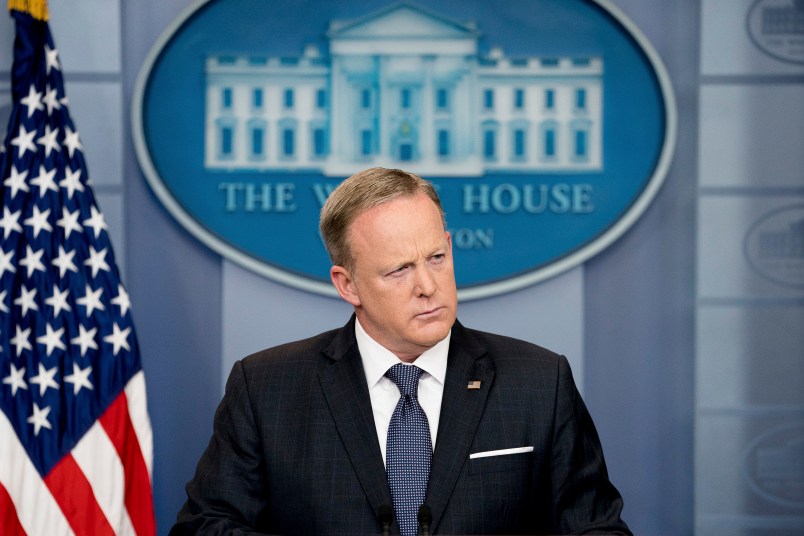White House press secretary Sean Spicer denied on Tuesday that the resignation of White House communications director Mike Dubke signaled a larger reorganization of the White House communications staff of strategy.
At his daily press briefing Tuesday, his first on camera in two weeks, Spicer was asked whether “the departure of Michael Dubke signal(s) some kind of broader reorganization in the West Wing.” A reporter also mentioned rumblings, reported by Politico and others, that campaign personalities Corey Lewandowksi and David Bossie were under consideration to help Trump get back on track amid the investigation into possible collusion between Trump campaign members and Russian officials.
Dubke, who had been the White House’s communications director for three months, submitted his resignation on May 18, though Axios was the first to report it on Tuesday.
“I don’t think so,” Spicer responded. “I think the President is very pleased with his team and he has a robust agenda, as I’ve just outlined, that he looks forward to working with Congress to get done to achieve the results for the American people.”
The reporter followed up, asking if the White House would follow through on ideas Trump floated after he abruptly fired FBI Director James Comey to change the daily briefing, “be it him communicating directly more, or more faces at the podium.”
“I don’t think that there is anything that we haven’t said before about how we’ve got — the President has an unbelievably qualified cabinet and we’ve utilized them a ton in the past. If we can continue to do that on key issues we’re going to do that,” Spicer said. “Ultimately the best messenger is the President himself.”
He added, asked if Trump was happy with the administration’s messaging strategy: “I think that he is frustrated like I am and so many others to see stories come out that are patently false, to see narratives that are wrong, to see, quote-unquote, fake news. When you see stories get perpetrated that are absolutely false, that are not based in fact, that is troubling. And he’s rightly concerned.”
CNN’s Jim Sciutto asked for an example of “fake news.”
“Yeah, absolutely, I’ll give you an example,” Spicer said, pointing to a viral tweet from a BBC reporter on Friday who claimed Trump was not listening to an earpiece translation of the Italian Prime Minister’s remarks at the G7 summit. In fact, he was, but the camera didn’t catch it.
A short clip that sums up this G7 summit: look who has chosen not to hear a translation of his Italian host's speech #G6 pic.twitter.com/6pXbBlfvof
— James Landale (@BBCJLandale) May 27, 2017
“And that’s the kind of thing that the BBC and ultimately a reporter who’s now joining the New York Times push out and perpetuate with no apology,” Spicer said, referring to a reporter who retweeted the video. He addressed the Times’ Peter Baker, who would later argue that Trump’s foreign trip had dominated the paper’s front page.
“You’re shaking your head, Peter, I mean, It’s true. You did it,” Spicer said.
Spicer’s ultimate complaint, though, continued to be with news organizations’ use of unnamed sources — despite the President’s own retweeting of articles citing an unnamed source, and White House officials’ frequent insistence on being quoted on background.
“There is a lot of this stuff that has gotten pushed out based on unnamed, unaccountable sources, that is very troubling,” Spicer said. “I think when you see the same thing happen over and over again, it is concerning.”







Spicer Lies, Creates Alternate Reality.
FIFY
Trump’s personal mouthpiece should be more careful about complaining that a “TWEET” was “fake news”.
Pot, meet the Kettle.
So Lewandowski and Bossie are going to join the WH and do what? Smear the Clintons?
“And that’s the kind of thing that the BBC and ultimately a reporter who’s now joining the New York Times push out and perpetuate with no apology,” Spicer said, referring to a reporter who retweeted the video.
Yes, that must be frustrating.
Speaking of which, has your fat piece of shit boss ever apologized for lying that President Obama was not born in the United States?
“I don’t think that there is anything that we haven’t said before about how we’ve got — the President has an unbelievably qualified cabinet and we’ve utilized them a ton in the past…"